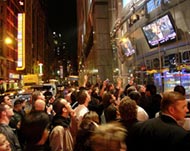Bush camp declares victory, Kerry concedes
Democratic challenger John Kerry has telephoned President George Bush to concede the election to the White House, according to campaign spokeswoman Stephanie Cutter.

Kerry is expected to make a formal statement later in the morning.
The Democrat had remained behind closed doors in his house in a Boston neighbourhood on Wednesday, as advisers wrestled whether to admit defeat in Ohio, a move that would have effectively handed Bush a second term in office.
Bush’s Republican campaign had already declared victory in the midwestern state, saying the president has a “statistically insurmountable” lead of 130,000 votes.
“We are convinced that President Bush has won re-election with at least 286 Electoral College votes,” Andrew Card, the White House chief of staff, told a Republican campaign victory rally in Washington early on Wednesday.
The aide called it a “decisive margin” of victory, with the president more than 3.5 million votes ahead of Kerry.
“In this election, President Bush received more votes than any presidential candidate in our country’s history.”
Archaic electoral system
But for the second straight time, a US presidential election foundered on the archaic US system based on 538 electoral votes that are awarded in separate state contests.
 |
|
Kerry (R) won at least 18 states |
The candidates and officials of both parties had been hoping to avoid a replay of the 2000 debacle, when Bush won only after a 36-day legal battle over the recount. In the end, Bush won the election by 537 votes.
Network projections early on Wednesday gave the Republican 28 states with 254 electoral votes, short of the 270 needed to win.
Kerry had 18 states and the federal capital, Washington DC, for 242 electoral votes.
The president led Kerry nationwide by 3.5 million votes, a sweet reversal from four years ago, when he lost the popular tally to Gore by more than half a million votes.
Ohio stalemate
Ohio’s 20 electors would bring Bush to the brink of victory.
Without them, he would need to snatch the midwestern states of Wisconsin (with 10 electors) and Iowa (with seven) from the Democrats. Both were too close to call.
The Democrats earlier said as many as 250,000 provisional ballots, which are subject to verification of the voter’s eligibility, could hold the balance in Ohio, where Bush led by more than 130,000 votes, according to the state’s unofficial toll.
|
“In this election, President Bush received more votes than any presidential candidate in our country’s history” Andrew Card,White House Chief of Staff |
Thousands of lawyers from both parties were ready to challenge close results after the longest and costliest campaign in US history, and the first presidential election since the September 11, 2001, attacks.
Up to 120 million people cast ballots in the election, in which each party held on to the states it had won in the 2000 contest between Bush and Democrat Al Gore – except for the Republican loss of New Hampshire and its four electors.
Turnout seemed to have approached a four-decade high, with long lines of voters reported across the country. Some queued for up to nine hours to cast ballots.
High turnout
So intense was the interest that some polling centres in Ohio and Pennsylvania stayed open after their scheduled close to accommodate the huge throngs.
Some claims of irregularities surfaced in Florida, however, with several voters complaining they had received phone calls or flyers sending them to the wrong polling precincts.
The candidates left their political fate in the voters’ hands on Tuesday after eight months and a billion dollars of campaigning.
 |
|
The election campaign produced |
US voters also decided the composition of Congress, where Republicans increased their majority in the 100-member Senate and 435-seat House of Representatives.
Voters cast ballots in the first election in 30 years to be held with US troops fighting abroad, delivering their verdict after a heated debate over the 2003 invasion of Iraq and a question of who could keep America safer from “terrorists”.
Bush, 58, the born-again Christian son of ex-president George Bush, campaigned as a “war president” ready to take the United States into battle alone if necessary to safeguard the country.
The 60-year-old Kerry, a decorated Vietnam War veteran, took a more nuanced stand, preaching the need to repair alliances rent by the Iraq war and to reconstruct an international consensus on the global war against “terrorism”.